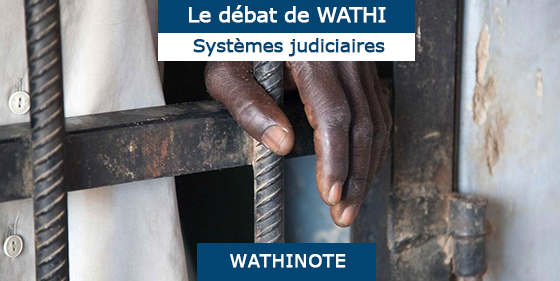

Author (s):
The Republic of Ghana Judiciary
Original document here
The District Court
The District Court makes up the largest number of courts in the country and statistically handles the largest number of cases.
Civil jurisdictions of this Court include all personal actions arising under contract or tort for recovery of any liquidated sum where the amount claimed does not exceed GH¢ 5000.00.
In criminal matters, the Court has jurisdiction to try summarily offences punishable by a fine not exceeding Five Hundred (500) penalty units or imprisonment for a term not exceeding (2) years or both.
Currently, there are a total of one hundred and seventy-five (175) Magistrates at post. Sixty-one (61) of them are Professional Magistrates and one hundred and fourteen (114) Career Magistrates.
The Circuit Court
Each Circuit Court is manned by a Circuit Judge. The jurisdiction of this Court includes civil actions arising under contract or tort or for recovery of all liquidated claims not exceeding GH¢ 10, 000.00, all landlord and tenant cases, ownership, possession, occupation and title to land cases.
The Circuit Court also has jurisdiction in applications for Probate and Letters of Administration where the value of the property does not exceed GH¢ 10, 000.00 and matters involving custody of children.
The Circuit Court has original jurisdiction in all criminal matters other than treason and offences punishable by death.
Appeals from Circuit Courts in civil cases go to the Court of Appeal and in criminal cases to the High Court.
Currently, there are sixty-four (64) Circuit Court Judges.
The High Court
The High Court is duly constituted by a single Judge unless he is required to sit with a jury or assessors. Unless otherwise specified by the Constitution, it has original jurisdiction in all matters, civil and criminal.
The Court has appellate jurisdiction as may be conferred on it by the Constitution or any other law.
Currently, it serves as the appellate body for appeals from criminal judgment of the Circuit Courts, all appeals from the District Courts, the Juvenile Courts and the Family Tribunals.
It has supervisory jurisdiction over all Lower Courts in the country. The High Court also has jurisdiction to enforce the Fundamental Human Rights and Freedoms guaranteed under the Constitution.
Currently, there are 108 Justices of the High Court.
Divisions of the High Court
- Commercial
- Land
- General Jurisdiction
- Divorce and Matrimonial
- Probate and Letters of Administration
- Industrial/Labour
- Criminal
- Financial and
- Human Rights
The Court of Appeal
- The Court of Appeal has no original jurisdiction. It serves as the appellate Court for the High Courts and the Circuit Courts, unless otherwise provided by law.
- Article 136 of the Constitution states that the Court of Appeal shall consist of the Chief Justice, not less than 10 other Justices of the Superior Court as the Chief Justice may request to sit in the Court of Appeal.
- Any three (3) Justices, however, duly constitute the Court.
- Currently, there are twenty-six (26) Justices of the Court of Appeal.
The Supreme Court
The Supreme Court is the final appellate body of the whole court system of the country.
It has the original and exclusive jurisdiction in all matters relating to the enforcement or interpretation of the Constitution and all matters arising as to whether an enactment was made in excess of the powers conferred on Parliament or any other authority or person by law or under the Constitution.
The Court has appellate jurisdiction to the exclusion of the Court of Appeal, and determines matters relating to the conviction of a person for high treason. Appeals from the National House of Chiefs are heard by the Supreme Court.The Supreme Court also has supervisory jurisdiction over all Courts in the country. The Court is to consist of not less than nine (9) Justices of the Supreme Court. For its work, the Court is duly constituted by five (5) Justices. Currently there are twelve (12) Justices of the Supreme Court
Les Wathinotes sont soit des résumés de publications sélectionnées par WATHI, conformes aux résumés originaux, soit des versions modifiées des résumés originaux, soit des extraits choisis par WATHI compte tenu de leur pertinence par rapport au thème du Débat. Lorsque les publications et leurs résumés ne sont disponibles qu’en français ou en anglais, WATHI se charge de la traduction des extraits choisis dans l’autre langue. Toutes les Wathinotes renvoient aux publications originales et intégrales qui ne sont pas hébergées par le site de WATHI, et sont destinées à promouvoir la lecture de ces documents, fruit du travail de recherche d’universitaires et d’experts.
The Wathinotes are either original abstracts of publications selected by WATHI, modified original summaries or publication quotes selected for their relevance for the theme of the Debate. When publications and abstracts are only available either in French or in English, the translation is done by WATHI. All the Wathinotes link to the original and integral publications that are not hosted on the WATHI website. WATHI participates to the promotion of these documents that have been written by university professors and experts.
